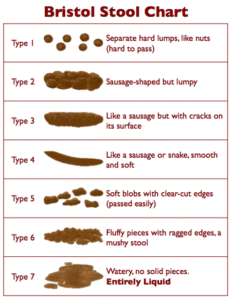The Bristol Stool Chart or Bristol Stool Scale is a medical aid designed to classify bowel movements into seven groups so you can understand what your stools are telling you. The ideal poop is #3 and #4, passed on a daily basis. If you are chronically experiencing #1 and #2, it’s a sign of constipation.
What should my stools look like?
The type of stool depends on the time it spends in the colon. After you pass the stool, what you see in the toilet bowl is basically the result of your diet, fluids, medications and lifestyle.

What are the signs of a healthy bowel?
Being ‘regular’ is a way of describing good bowel habits or normal bowel function. Being regular really means that soft yet well-formed bowel motions are easily passed and happen at least once per day.
The bowel usually wants to empty about 30 minutes after a meal (commonly breakfast), but this can vary from person to person.
A bowel movement is normally brown or golden brown and should be formed, and have a size and shape similar to a sausage. It should be soft and easy to pass.
Good bowel function for adults
There’s more to good bowel function than just being regular. For example, you should be able to:
- hold on for a short time after you feel the first urge to go to the toilet – this allows time to get there and remove clothing without any accidents
- pass a bowel motion within about a minute of sitting down on the toilet
- pass a bowel motion easily and without pain – ideally, you shouldn’t be straining on the toilet or struggling to pass a bowel motion which is hard and dry, and
- completely empty your bowel when you pass a motion – you don’t have to go back to the toilet soon after, to pass more.
A change in bowel habits includes any constant change in bowel frequency, colour, consistency, or shape. This warrants special concern in people over the age of 50 years because they are at greater risk of developing a digestive disease.
QUICK TIPS TO ENCOURAGE REGULAR BOWEL MOVEMENTS
- Reduce stress, particularly while you’re eating (to increase important levels of acid in your stomach),
- Drink plenty of water with a minimum of 10-12 glasses of water per day (using your urine colour as a gauge of hydration),
- Eat a healthy diet containing plenty of fibre-rich food, and
- Incorporate exercise to keep your body moving and metabolism optimally functioning.
- You may also be lacking important vitamins and minerals, or have a hormone imbalance, poor gut bacteria, or food sensitivities.








